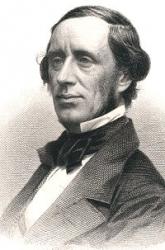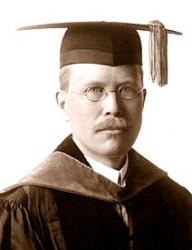Planning worship?
Check out our sister site, ZeteoSearch.org,
for 20+ additional resources related to your search.
- |
User Links
Person Results
F. A. Gore Ouseley

1825 - 1889 Composer of "ST. GABRIEL" in The Hymnal Born: August 12, 1825, London, England.
Died: April 6, 1889, Hereford, England.
Buried: Church of St. Michael and All Angels, Tenbury Wells, Hereford and Worcester, England.
Gore-Ouseley was educated at Oxford University (BA 1846, MA 1849, DMus 1854), and was ordained in 1849. In 1855, he was appointed Oxford Professor of Music, succeeding Henry Bishop. At that time, Oxford music degrees were easy to obtain, as there were no conditions of residence. Candidates only had to submit a musical composition, (e.g., for choir or orchestra). This was then approved by the examiner, rehearsed and performed to a small, select audience at Oxford. As far as Ouseley was concerned, this only meant two or three trips to Oxford each year, usually for two or three days each time, as there was no music "taught" in the university and very little in Oxford itself at the time.
Also in 1855, Ouseley was appointed Precentor of Hereford Cathedral, a post he held for the next 30 years, before becoming a Canon there. Although theoretically in charge of the cathedral choir, Ouseley only had to be in residence at the cathedral two months each year, and he arranged these to take place during the summer vacation, when he was not required to be at his College, although such was his commitment that he did make regular visits to the cathedral, which was only 18 miles from his College at St. Michael’s.
His College of St. Michael’s, Tenbury, a "model" choir school, opened in 1856, mostly at his own expense. He founded the College and was its first Warden, which was the greater part of his work for the next 33 years.
Ouseley’s compositions covered a wide range: operas, songs, chamber music and organ pieces. His works include the following treatises:
Harmony (London: 1868)
Counterpoint (London: 1869)
Canon and Fugue (London: 1869)
Form and General Composition (London: 1875)
--www.hymntime.com/tch/
F. A. Gore Ouseley
John Adcock
1838 - 1919 Person Name: J. Adcock Composer of "WOODTHORPE" in In Excelsis for School and Chapel
John Adcock
George Lomas
1834 - 1884 Person Name: G. Lomas Composer of "SOUTHPORT" in The Chapel Hymnal Born: 1834, Birch Hall, Bolton, Lancashire, England.
Died: 1884, Sheffield, South Yorkshire, England.
A student of William Sterndale Bennett and Charles Steggall, Lomas received his BMus degree from New College, Oxford. He played the organ at Didsbury Parish Church, and at Emmanuel Church, Barlow Moor, Manchester (1858-84).
Music: CHAMOUNI
ST. PAUL'S COLLEGE
SURSUM CORDA
http://www.hymntime.com/tch/bio/l/o/m/lomas_g.htm
=============
George Lomas was born in England and was a volunteer organist for twenty-five years before becoming a professional musician. He received his Bachelor of Arts degree in music at age forty-five, only five years before his death.
The Presbyterian Hymnal Companion, 1993
George Lomas
Robert N. Quaile
1867 - 1937 Person Name: Robert N Quaile Composer of "OLDBRIDGE" in The A.M.E. Zion Hymnal Son of a Methodist pastor, Quaile was educated at Wesley College in Dublin. He went into business in Mallow and pursued music as a hobby. Three of his tunes appeared in the 1910 English Methodist Sunday School Hymnal. Ten years later, he lost all his possessions in the 1920 Irish uprising.
—The Cyber Hymnal™
Robert N. Quaile
Herbert Stephen Irons
1834 - 1905 Person Name: H. S. Irons, b. 1834 Composer of "ST. CORENTIN" in Church Hymns Born: January 19, 1834, Canterbury, Kent, England.
Died: June 29, 1905, Nottingham, England.
Irons was a nephew of the brothers Stephen & George Elvey. He became a chorister at Canterbury Cathedral under T. E. Jones. After studying music under Stephen Elvey at Oxford, he was appointed organist at St. Columba’s College, a large public school at Rathfarnham, near Dublin, Ireland. He stayed there only a few months before being offered the position of organist at Southwell Minister. From Southwell, he went to Chester as assistant organist to Frederic Gunton. Three years later, he accepted an appointment at St. Andrew’s Church, Nottingham, where he remained until his death.
--www.hymntime.com/tch
Herbert Stephen Irons
John Hullah

1812 - 1884 Composer of "HULLAH" in Gloria Deo Born: June 27, 1812, Worcester, England.
Died: February 21, 1884, London, England.
John Hullah
William Sterndale Bennett

1816 - 1875 Person Name: W. S. Bennett Composer of "[The radiant morn hath passed away]" in The Westminster Abbey Hymn-Book William Sterndale Bennett, born in Sheffield, England, April 13, 1816, died in London, Feb. 1, 1875. His father, an organist, died when he was three years old, and his education was cared for by his grandfather. At the age of eight (1824) he entered the choir of King's College Chapel at Cambridge, where his grandfather lived, and in 1826 was sent to London to study at the Royal Academy of Music. Here he studied composition under Lucas and Dr. Crotch, and pianoforte, first under W. H. Holmes, and then under Cipriani Potter. His first composition of note was his D minor pianoforte concerto, op. 1, written in 1832 and played by himself at the prize concert at the Academy in 1833. Mendelssohn was present and greatly encouraged the young composer. In 1836 the firm of Broadwood offered to pay his expenses for a year's study in Leipsic; here he came under the influence of Mendelssohn and Schumann, both of whom held his talent in high esteem. He came back to London after the specified year, but returned to Leipsic for another year's study in 1840. In 1843 he began to give successful chamber concerts in London, and in 1844 married Mary Anne Wood, daughter of a captain in the Navy. In 1849 he founded the London Bach Society, one of the results of which was the first performance in England of the Matthew Passion, April 6, 1854. In 1853 he was offered the conductorship of the Leipsic Gewandhaus concerts, and in 1856 he was elected to the chair of musical professor at the University of Cambridge, and shortly afterwards received the degree of Mus. Doc. In 1856 he was also made permanent conductor of the Philharmonic Society, a post which he resigned ten years later to become principal of the Royal academy of Music. In 11867 he received the Cambridge degree of M.A. and a salary of 100 pounds was joined to his professorship. In 1870 the University of Oxford conferred upon him the honorary dgree of D.C.L. He was knighted in 1871, and a scholarship was founded at the Royal academy of Music out of subscriptions to a public testimonial to him in St. James's Hall in 1872. He died after a short illness, and was buried in Westminster Abbey. Bennett has been called the first English composer of individual genius since Purcell; he certainly was the first English composer who go any real recognition in Germany. He has generally been considered as a follower and imitator of Mendelssohn, although the best English critics deny this. Yet he may truly be said to have held more by Mendelssohn than by Schumann. His compositions are noteworthy for an easy grace, refinement, and elaborate perfection of style.
Cyclopedia of Music and Musicians by John Denison Camplin, Jr. and William Foster Apthorp (Charles Scribner’s Sons, 1888)
https://archive.org/details/cyclopediaofmusi01cham/mode/2up
William Sterndale Bennett
Lindsay B. Longacre

1870 - 1952 Composer of "THE RADIANT MORN" in The Riverdale Hymn Book Lindsay Bartholomew Longacre was born in Pottsville, Pennsylvania, on January 26, 1870, the son of Orleans and Rachel (Bartholomew) Longacre. Longacre wanted to become a musician, but pursuant to his father’s wishes, he attended the Columbia University School of Mines and was graduated from there with a degree in mining engineering in 1892. Following a call to the ministry, he attended Drew Theological Seminary, where he received a B.D. degree in 1896, and was subsequently ordained a minister in the Methodist Church that same year.
From 1896-1910, Rev. Longacre served several small churches in the New York Conference.
These included Glenville, St. Luck, Madison Avenue (later called Christ Methodist after a move to a new location), Fifty-Sixth Street Church, Morris Heights, and Woodlawn Heights. His pastorate at Madison Avenue Church was as the Assistant Pastor to Andrew Longacre, his uncle.
In 1910, Dr. Longacre was appointed head of the Department of Old Testament Literature and Religion of the Iliff School of Theology. He held that position for 32 years. On several occasions during his tenure at Iliff, Dr. Longacre also acted as president of the school. He authored four books, a number of articles, and church school curriculum. His books are: A Prophet of the Spirit: A Sketch of the Character and Work of Jeremiah (1917 and 1922); Amos, Prophet of a New Order (1921; translated into Burmese in 1939); Deuteronomy, A Prophetic Lawbook (1924); and The Old Testament: Its Form and Purpose (1945). He was invited to submit three articles to the Abingdon Bible Commentary(1929). These articles are entitled “The Bible as Literature,” Numbers,” and “Joshua.” Dr. Longacre also held membership in the National Association of Biblical Instructors and the Society of Biblical Literature and Exegesis.
During his tenure at Iliff, Dr. Longacre was involved in a controversy known as the “fundamentalist-modernist controversy.” This controversy, which reached its height in the 1920s, grew out of reactions to the liberal approach that the school had taken toward religion and education. These reactions, from both inside and outside the Methodist Church, were in response to the school’s use of higher criticism in the teaching of Biblical studies.
While at Iliff, Dr. Longacre also taught courses in preaching, worship, and hymnology. He had nurtured his love for music as an avocation, and wrote many hymns and songs. Some of these hymns were published in The Riverdale Hymn Book (1912), The Methodist Hymnal (1935), The Hymnal (Evangelical and Reformed Church) (1941), and The Story of Our Hymns: The Handbook to the Hymnal of the Evangelical and Reformed Church (1952). He believed that great hymns were “God-centered.” In addition to composing music, he wrote explanatory notes for various Denver Symphony programs, and had a special love for opera. He also held membership in the Hymn Society of America, the American Guild of Organists, and the Quill Club of New York.
In his courses on worship, Dr. Longacre expected no loess that excellence from his students in planning and leading services. He felt that worship should be be “truly theocentric.” Because of his interests in music and worship, he served on the Commission on Ritual and Orders of Worship of the Methodist Church from 1940-44. The Commission produced a new Book of Worship for Church and Home. Dr. Longacre contributed introductory sentences to accompany selected readings in two sections: “Scriptures for Reading and Meditation” and “Daily Readings and Prayers for a Month.”
Dr. Longacre retired from Iliff in 1942. He and Florence Biggart Longacre, his second wife of six years, then made a brief move to California. (His first wife, Arabella Hyland Longacre, had passed away in 1930.) After returning to Denver, he played a leading role in the 1944 University of Denver production of Thornton Wilder’s Our Town. It was his first acting experience. That same year, the Longacre’s returned to New York City to pursue his interest in music and the arts through the cultural activities of the city. From 1947-1952, Dr. Longacre served as the Assistant Pastor to the Rev. Ralph W. Sockman of Christ Methodist Church.
Dr. Lindsay B. Longacre died at the age of 82 years on September 18, 1952, after a long and distinguished career of service to the church and humanity.
© 2002. Marshall Eidson
http://www.iliff.edu/research/archives/longacre/bio.htm
Lindsay B. Longacre
Leonard B. McWhood
1870 - 1939 Person Name: L. B. McWhood Composer of "DREW" in Fellowship Hymns
Leonard B. McWhood


 My Starred Hymns
My Starred Hymns


